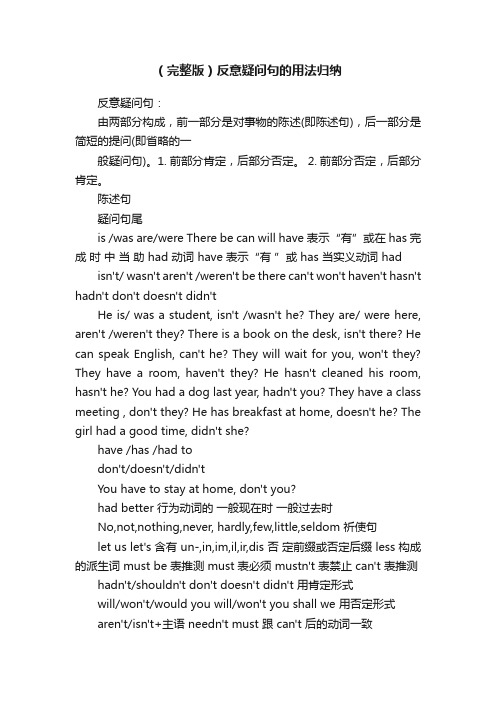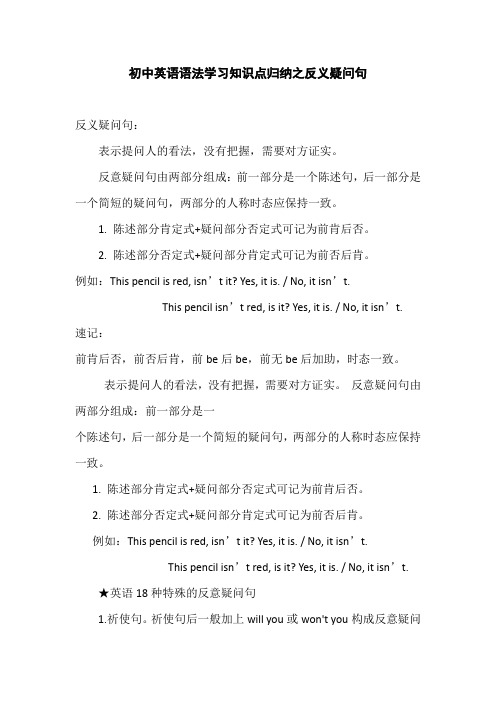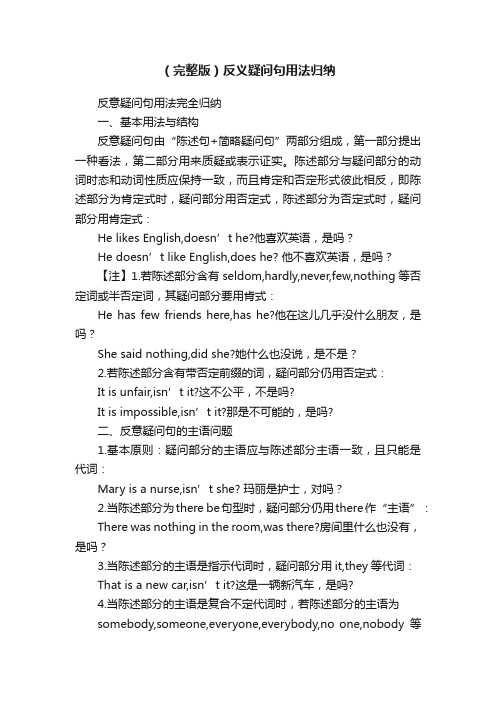八年级英语上册知识点总结:反义疑问句【DOC范文整理】
(完整版)反意疑问句的用法归纳

(完整版)反意疑问句的用法归纳反意疑问句:由两部分构成,前一部分是对事物的陈述(即陈述句),后一部分是简短的提问(即省略的一般疑问句)。
1. 前部分肯定,后部分否定。
2. 前部分否定,后部分肯定。
陈述句疑问句尾is /was are/were There be can will have 表示“有”或在 has 完成时中当助 had 动词 have 表示“有”或 has 当实义动词 had isn't/ wasn't aren't /weren't be there can't won't haven't hasn't hadn't don't doesn't didn'tHe is/ was a student, isn't /wasn't he? They are/ were here, aren't /weren't they? There is a book on the desk, isn't there? He can speak English, can't he? They will wait for you, won't they? They have a room, haven't they? He hasn't cleaned his room, hasn't he? You had a dog last year, hadn't you? They have a class meeting , don't they? He has breakfast at home, doesn't he? The girl had a good time, didn't she?have /has /had todon't/doesn't/didn'tYou have to stay at home, don't you?had better 行为动词的一般现在时一般过去时No,not,nothing,never, hardly,few,little,seldom 祈使句let us let's 含有 un-,in,im,il,ir,dis 否定前缀或否定后缀 less 构成的派生词 must be 表推测 must 表必须 mustn't 表禁止 can't 表推测hadn't/shouldn't don't doesn't didn't 用肯定形式will/won't/would you will/won't you shall we 用否定形式aren't/isn't+主语 needn't must 跟 can't 后的动词一致We'd better go now, hadn't/shouldn't we? They like playing football, don't they? He likes music, doesn't he? The woman bought a book, didn't she? He has hardly done his homework, has he? Please turn it on, will/won't/would you? Let us help him, will/won't you Let's have a rest, shall we? She dislikes it, doesn't she? You are unhappy, aren't you? You are hopeless, aren't you? He must be happy, isn't he ? You must do it today, needn't you? You mustn't talk like that, must you? He can't be a doctor, is he?I am 主从复合句 I think/believe/guess/ suppose+宾语从句并列句 used toaren't /ain't I; am I not I am your friend, aren't I一般跟主句一致He said she had been there, didn't he?动词和主语跟从句一 I think he'll come to help us, won't he? 致,用肯定还是否定 I don't think he is clever, is he? 根据主句来确定与邻近的分句一致Mary is here, but she was here just now, wasn't she?usedn't/didn'tHe used to be a teacher, usedn't/didn't he?5陈述句主语疑问句尾主语例句this, thatitThis is your brother, isn't it?These, thosetheyThese are not books, are they?oneone, heOne can't be always young, can one/he?something, anythingitNothing is serious, is it?everything, nothingEverything seems all right, doesn't it?everybody, everyoneEveryone knows this, don't they/doesn't he?somebody, someoneNobody likes to lose money, does he?anybody, anyonethey ,heNo one came , did they?nobody, no one,noneeither, neithereach ofthey ,heEach of the boys had an apple, didn't he /they?some(none) ofIt 或 they ,you None of the food was delicious, was it?Some of the men have come back, haven't they?or, and , neither…nor, either…or, both…and 复数代词Neither you nor I am wrong, are we? Both Tom and Jack came, didn't they?not only… but also not...but 等连接的并列主语不定式,动名词,从句或词组 the+ 形容词表示一类人 there 引起的句子it 复数代词 thereTo learn English well isn't easy, is it? Swimming is great fun,isn't it? The poor had no right to speak at that time, did they? There stands a house and a lot of trees, doesn't一、选择填空they? 6.--That's wrong, isn't it? -- ______1.Jim is a driver,_____?A. Yes, it is.B. Yes, it isn't.A. does heB. doesn't heC. is heD. isn't heC. No, it is.D. Yes, it was.2.You have a sports meeting every year,___? 7. Let's take a short rest, ______?A. have youB. do youA. do weB. aren't weC. haven't youD. don't youC. will youD. shall we3. He has never watched such an important8. Five-year-old children are too young to gomatch , _____ he?to school, ________ they?A. hasn'tB. hasC. isD. isn'tA. areB. aren'tC. wereD. have4.They have to work at once,______ they?9. Hundreds of people lost their lives in theA. haveB. haven'tC. doD. don'taccident,_______ they?5. She often feels tired,______ she?A. don'tB. didn'tC. doD. didA. doesn'tB. doesC. isD. isn't10.There isn't any bread on the table, ______?6A. isn't thereB. is thereC. has thereD. is it11. Mr King can not speak Chinese,____ he?A.doesn'tB. doesC. can'tD. can12. Lily didn't come to school, did she?____. She was ill in bed.A.No ,she didB. Yes , she did.C. No ,she didn't.D. Yes ,she didn't13.--She isn't a teacher, is she?--_____. She works in a hospital.A.No ,she isB. Yes , she is.C. No ,she isn't.D. Yes ,she isn't14.Lily looks like Lucy,_______?A. is LilyB. isn't sheC. does LillyD. doesn't she15.Tom often has lunch at school,_____?A. doesn't TomB. doesn't heC. does TomD. doesn't he16. Your family has no colour TV___it?A. hasn'tB. doesn'tC.isD. has17.You could hardly believe what he had said, _____ you?A. couldB. couldn'tC. canD. were18. --You don't smoke, do you?--______.A. Yes, I don'tB. No, I doC. No, I don'tD. Yes, I am.二、完成下列反意疑问句.1.You are late, ________ __________?2.He is on time,_________ _________?3.They were in the classroom just now,________ _________?4.She was ten years old last year_________________?5. They are going hiking next Sunday,________ _________?6.That cat is running up the tree.7.Ann is going to help me with my English8 There is some water in the bottle,___________________?9.There are many soldiers over there, _______ __________?10.He can skate, __________ ___________? 11.My parents can play chess,_____ ______? 12. They will work on the farm,________ _________? 13. My parents will visit my grandparents next Monday,________ _________? 14. They have written nine books since 1995,________ _________? 15, The woman has already found her son. ,________ _________? 16. They have three balls,_______ ______? 17. Jack has two sister,________ _______? 18.They have six classes every day,________ _________? 19.Tom has lunch at home,_____ _________?20.The students had a good time last Sunday,___________ ____________? 21. We have to finish it,______ ________? 22. The workers had to take the first bus, ________ _________? 23. You had better stay at home today, _________ __________? 24.We clean our classroom every day, ________ _________? 25. He watches TV on Saturday evening,________ _________? 26. The boys often play football on the playground,________ _________? 27.The singerswent to H.K yesterday, ________ _________? 28.They studied hard last year,________ _________? 29.They planted many trees last month,________ _________? 30.This pen is yours,_________ __________? 31.That was a wonderful film,______ _____?32.Everything is ready, ________ ________? 33.There is nothing wrong with the radio,___734.He did little homework yesterday, _______ __________?35.You'd like some coffee,______ ______? 36.Let's have a rest, _______ ____________? 37.Let us read the text, ________ ________?38.Don't read in bed, _________ _________? 39. Stop laughing,_______ __________? 40. He has to go there at eight,______ _____? 41.He has never been to Beijing, _____ ____? 42.She can hardly speak,_______ ________? 43.Few people know her here______ _____? 44.His mother was unhappy when she heard the news, _____ _______? 45.She dislikes watching football match____ ______? 46.He used to swim in the river,____ _____? 47.I think your brother is right, ____ ______?48. I don't think he will go there,____ _____?选择疑问句选择疑问句说话人对问题提出两个或两个以上的选项,让对方选择回答。
八年级英语反义疑问句

八年级英语反义疑问句否定意义的词否定意义的词(1)当陈述部分有never,eldom,hardly,few,little,barely,carcely,nothing,none,rarely等否定意义的词汇时,后面的反意疑问句则为肯定形式:Therearefewappleinthebaket,arethereHecanhardlywim,canhe(2)当陈述部分含有否定意思的词是unhappy,dilike,unfriendly 等含有否定词缀的派生词,也就是有un-前缀、-le后缀等含有词缀而意思否定的词,当做肯定句处理,疑问部分要用否定形式。
如:Helookunhappy,doen'the他看上去不高兴,不是吗?Thegirldilikehitory,doen'the这女孩不喜欢历史,不是吗?有le,fewer等词视为肯定词,疑问部分用否定形式。
如:Therewillbelepollution,won'tthere表示主语主观意愿的词含有think,believe,uppoe,imagine,e某pect等动词后接宾语从句构成的主从复合句在构成反意疑问句时,视情况不同有两种不同的构成方式。
(1.)当主句的主语为第一人称时,其后的简短问句应与从句相一致。
例如:Ie某pectourEnglihteacherwillbebackthiweekend,won'the/heWeuppoeyouhavefinihedtheproject,haven'tyou值得注意的是,当这些动词后接的宾语从句的否定转移到主句时,其仍属否定句,故其后的简短问句应用肯定式,而非否定式。
例如:Idon'tbelievethathecantranlatethibook,canheWedon'timaginethetwin havearrived,havethey此类句子的回答同"前否后肯"型反意疑问句一样,如上述后一个句子,若双胞胎已经到了,则回答为"Ye,theyhave.";若尚未到达,使用"No,theyhaven't."。
初中英语语法学习知识点归纳之反义疑问句

初中英语语法学习知识点归纳之反义疑问句反义疑问句:表示提问人的看法,没有把握,需要对方证实。
反意疑问句由两部分组成:前一部分是一个陈述句,后一部分是一个简短的疑问句,两部分的人称时态应保持一致。
1. 陈述部分肯定式+疑问部分否定式可记为前肯后否。
2. 陈述部分否定式+疑问部分肯定式可记为前否后肯。
例如:This pencil is red, isn’t it? Yes, it is. / No, it isn’t.This pencil isn’t red, is it? Yes, it is. / No, it isn’t.速记:前肯后否,前否后肯,前be后be,前无be后加助,时态一致。
表示提问人的看法,没有把握,需要对方证实。
反意疑问句由两部分组成:前一部分是一个陈述句,后一部分是一个简短的疑问句,两部分的人称时态应保持一致。
1. 陈述部分肯定式+疑问部分否定式可记为前肯后否。
2. 陈述部分否定式+疑问部分肯定式可记为前否后肯。
例如:This pencil is red, isn’t it? Yes, it is. / No, it isn’t.This pencil isn’t red, is it? Yes, it is. / No, it isn’t.★英语18种特殊的反意疑问句1.祈使句。
祈使句后一般加上will you或won't you构成反意疑问句,用will you 多表示“请求”,用won't you 多表示提醒对方注意。
例如:Look at the blackboard, will you/ won't you?看黑板,好吗?Let 引导的祈使句有两种情况:1) Let's...后的反意疑问句用shall we或shan't we。
例如:Let's go home, shall we/ shan't we? 回家吧,好吗?还可以用may I来表示征求对方的同意或许可。
(完整版)反义疑问句用法归纳

(完整版)反义疑问句用法归纳反意疑问句用法完全归纳一、基本用法与结构反意疑问句由“陈述句+简略疑问句”两部分组成,第一部分提出一种看法,第二部分用来质疑或表示证实。
陈述部分与疑问部分的动词时态和动词性质应保持一致,而且肯定和否定形式彼此相反,即陈述部分为肯定式时,疑问部分用否定式,陈述部分为否定式时,疑问部分用肯定式:He likes English,doesn’t he?他喜欢英语,是吗?He doesn’t like English,does he? 他不喜欢英语,是吗?【注】1.若陈述部分含有seldom,hardly,never,few,nothing等否定词或半否定词,其疑问部分要用肯式:He has few friends here,has he?他在这儿几乎没什么朋友,是吗?She said nothing,did she?她什么也没说,是不是?2.若陈述部分含有带否定前缀的词,疑问部分仍用否定式:It is u nfair,isn’t it?这不公平,不是吗?It is impossible,isn’t it?那是不可能的,是吗?二、反意疑问句的主语问题1.基本原则:疑问部分的主语应与陈述部分主语一致,且只能是代词:Mary is a nurse,isn’t she? 玛丽是护士,对吗?2.当陈述部分为there be句型时,疑问部分仍用there作“主语”:There was nothing in the room,was there?房间里什么也没有,是吗?3.当陈述部分的主语是指示代词时,疑问部分用it,they等代词:That is a new car,isn’t it?这是一辆新汽车,是吗?4.当陈述部分的主语是复合不定代词时,若陈述部分的主语为somebody,someone,everyone,everybody,no one,nobody等复合不定代词,其反意疑问句的主语在正式文体中用he,在口语或非正式文体中通常用they:Nobody was late,were they?没有一个人迟到,是吗?5.当陈述部分的主语是something,anything,nothing,everything等复合不定代词时,其反意疑问句的主语要用it:Everything is ready,isn’t it? 一切都准备好了吗?Nothing is important,is it?没有什么重要的,不是吗?三、陈述部分有动词have的反意疑问句1.当have为助动词时,其反意疑问句沿用同样的助动词:He has already left,hasn’t he?他已经离开了,是吗?2.当have为实意动词时,要分两种情况:①若表示“所有”,反意疑问句可以用have,也可以用do:He has a lot of friends here,hasn’t[doesn’t]he?他在这儿有许多朋友,是吗?但是若陈述部分用的是have的否定式,反意疑问句用have还是用do,取决于陈述部分的动词形式:He hasn’t any money,has he?他没有钱,是吗?He doesn’t have any money,does he?他没有钱,是吗?②若表示“吃”、“玩”等意思,反意疑问句要用do:He has suppe r at5,doesn’t he? 他5点吃晚餐,是吗?He had a good time at the party,didn’t he?他在晚会上玩得很开心,是吗?3.当用于have to时,通常也有两种可能:若表示经常性的行为,则多用加助动词do的形式;若表示特定的行为,则多用have:He often has to get up early,doesn’t he?他经常要早起,是吗?He has to go to bed late tonight,hasn’t he?他今晚要迟睡,是吗?四、含情态动词的反意疑问句1.基本原则:在通常情况下,当陈述部分含有情态动词时,疑问部分会重复前面同样的情态动词:He can speak English,can’t he?他会说英语,是吗?We shouldn’t go,should we?我们不应该去,对不对?2.当陈述部分含有must时,要分两种情况:①若must表示“必须”或“有必要”,疑问部分用mustn’t或needn’t:You must leave at once,mustn’t[needn’t]you?你必须(有必要)马上离开,是吗?但是若陈述部分有mustn’t表示禁止,疑问部分要must:You mustn’t laugh,must you?你不准笑,知道吗?②若must表示推测,疑问部分不能用must,而应根据must后的动词结构采用相应的动词形式:He must be tired,isn’t he?他一定累了,是吗?五、陈述部分为祈使句的反意疑问句1.基本原则:若陈述部分为祈使句,疑问部分通常用will you:Please help us,will you?请帮帮我们,好吗?Come with us,will you?同我们一起去,好吗?Don’t forget to post the letter,will you?请别忘了寄信。
反义疑问句知识点

反义疑问句反义疑问句:在陈述句后附加一个简短的疑问句,可以表示疑问,也可以表示说话者的某种倾向,强调或反问。
反义疑问句通常由两个词组成:第一个词是be、情态动词、助动词;若为否定,not用简略形式。
第二个词是人称代词主格(与陈述句主语相同)。
例:……,can't we? 和……,can we?⑴一般情况下:前面陈述句是肯定句,后面反义疑问句部分用否定;即“前肯定后否定,前否定后肯定”。
⑵当陈述句部分有表示否定或部分否定意义的词如little,barely,hardly,rarely,scarcely,seldom,few,no,never,nothing,not等词时,反意疑问句部分要用肯定形式。
You can hardly blame Tom for leaving early, can you?你不能责怪汤姆提前离开,是吗?当陈述句部分中表示否定意义的词为含有im-,in-,dis-,un-等否定前缀或-less等否定后缀的词时,应把陈述句部分视为肯定句,反意疑问句部分要用否定形式。
(有否定意义,但不能算否定词)Tom dislikes the book,doesn't he? 汤姆不喜欢这本书,是吗?⑶陈述句主语不同情况①当陈述句部分的主语是everyone,someone,anyone,no one,everybody,somebody,anybody,nobody等表示人的不定代词时,反意疑问句部分的主语通常用he,但口语多用they;Nobody wants to go here,does he/do they?没有人想去那里,是不是?②当陈述句部分的主语是anything,everything,nothing,something 等表示物的不定代词时,反意疑问句部分的主语常用it.Everying seems all right now,doesn't it?似乎一切顺利,是不是?②当陈述句部分的主语是I 时,反意疑问句部分的主语常用aren't I.若表示征询对方意见时,疑问句部分用do you.I am healthy,aren't I?我很健康,对吗?I don't like this film,do you?我不喜欢这部电影,你呢?④当陈述句部分的主语是不定式(短语)或动名词(短语)时,反意疑问句部分的主语常用it.Learning English well takes a long time,doesn't it?学好英语需要好长时间,是不是?②当陈述部分的主语是指示代词this /that或these /those时,疑问句中的主语分别用it或theyThis is important, isn't it? 此事很重要,是不是?②如果陈述部分是以代词one作主语疑问句的主语,在正式场合用one 非正式场合用you在美国英语中非正式场合下,还可以用heOne cannot be too careful, can one /can you? 越仔细越好,对不对?②陈述部分有neither…nor 或both …and连接两个主语时,疑问句部分的主语常用复数形式。
反义疑问句(最全)

4.陈述部分有had better + v. 疑问句部分用hadn’t you? You’d better read it by yourself, hadn’t you? 5.陈述部分是“there be”结构时,疑问部分用there省略主语代词。 There is something wrong with your watch, isn't there? There will not be any trouble, will there? Note: 当为“ there used to be…”句型时,反意问句用didn’t there。
反义疑问句
Question Tags
演讲人姓名
CLICK HERE TO ADD A TITLE
附加疑问句
附加疑问句(Question Tags)又叫反意疑问句。反意疑问句由两部分组成:前一部分是一个陈述句,后一部分是一个简短的疑问句,两部分的人称时态应保持一致。
ห้องสมุดไป่ตู้
question tags
有情态动词的反意疑问句
(一)句中陈述部分没有表示过去的时间状语,这时疑问部分中的动词就用现在完成时。 (haven’t / hasn’t + 主语) You must have told her about it, haven’t you? (二)陈述部分有表示过去的时间状语,疑问部分的动词就用一般过去时。(didn’t + 主语) She must have read the novel last week, didn’t she?
三、特殊句型的反义疑问句: 省去主语的祈使句的反意疑问句,疑问部分用will you。 Don’t do that again, will you? Go with me, will you / won’t you ? 这里就不符合“前否后肯”的原则,而是“前肯后可肯可否” Note : Let‘s 开头的祈使句,后用shall we? Let's go and listen to the music, shall we/shan't we? Let us 开头的祈使句,后用will you? Let us wait for you in the reading-room, will you/won't you?
初中英语反意疑问句的知识点
初中英语反意疑问句的知识点在我们上学期间,大家最不陌生的就是知识点吧!知识点是传递信息的基本单位,知识点对提高学习导航具有重要的作用。
还在苦恼没有知识点总结吗?下面是作者为大家收集的初中英语反意疑问句的知识点,仅供参考,希望能够帮助到大家。
反意疑问句:表示提问人的看法,没有把握,需要对方证实。
反意疑问句由两部分组成:前一部分是一个陈述句,后一部分是一个简短的疑问句,两部分的人称时态应保持一致。
1. 陈述部分肯定式+疑问部分否定式可记为前肯后否。
2. 陈述部分否定式+疑问部分肯定式可记为前否后肯。
例如:This pencil is red, isn’t it? Yes, it is. / No, it isn’t.This pencil isn’t red, is it? Yes, it is. / No, it isn’t.速记:前肯后否,前否后肯,前be后be,前无be后加助,时态一致。
反意疑问句的回答:前肯后否,前否后肯,根据事实从后往前翻译。
如:(1)They work hard,don’t they?他们努力工作,不是吗?Yes, they do.对,他们工作努力。
, they dont.不,他们工作不努力(2)They don’t work hard, do they? 他们不太努力工作,是吗?Yes, they do. 不,他们工作努力。
, they dont. 是的,他们工作不努力否定反义疑问句的回答当陈述部分为肯定式,反义疑问句为否定式时,其回答一般不会造成困难,一般只需照情况回答即可:"It’s new, isn’t it?" "Yes, it is." “是新的,不是吗?”“是,是新的。
”"He wants to go, doesn’t he?" "No, he doesn’t." “他想去,不是吗?”“不,他不想去。
(完整版)初中英语反义疑问句的用法归纳
反义疑问句It looks like rain, doesn’t it?He doesn’t need to work so late, does he?This is a dictionary, isn’t it?Those are shelves, aren’t they?There once was a man named Saint Nicholas, wasn’t there?I am very interested in learning English, aren’t I?4)陈述句的主语是动词不定式,动词的-ing形式或从句时,疑问部分的主语多用it来体现。
如:Taking care of our environment is very important, isn’t it?What he said is right, isn’t it?5)陈述句中含有not, no, hardly, neither, never, few, little, too …to等否定词或具有否定意义的词时,疑问部分常用肯定形式。
如:Few people knew the news, did they?Tom has never been to England , has he?She is unhappy, isn’t she?No one knows him, do they?Someone is waiting for you, isn’t he?Nobody says a word about the accident, do they?Everything seems all right, doesn’t it?7)陈述句是主从复合句时,如果主句的谓语动词是think, believe, expect, feel, guess等词,且主语是第一人称I或we时,反意疑问部分的人称、时态与宾语从句保持一致,同时还要考虑到否定的转移(否定前移)。
反义疑问句知识点总结全面
反义疑问句知识点总结全面反义疑问句主要有以下几个特点:1. 反义疑问句通常由一个肯定或否定的陈述句和一个问句组成。
问句的结构是“否定词+主语+谓语”。
2. 反义疑问句的否定词通常是“isn’t”、“aren’t”、“wasn’t”、“weren’t”、“don’t”、“doesn’t”、“didn’t”、“hasn’t”、“haven’t”、“hadn’t”、“couldn’t”等。
3. 反义疑问句的句式结构是“陈述句+问句”,陈述句和问句之间用逗号分隔。
4. 反义疑问句在语气上往往表示说话者对自己所说的话进行确认或怀疑。
反义疑问句的结构和用法:1. 反义疑问句用于肯定句时,通常使用否定词“isn’t”、“don’t”、“didn’t”、“doesn’t”、“hasn’t”、“hadn’t”等结构。
例如:You are coming to the party tonight, aren’t you?2. 反义疑问句用于否定句时,通常使用肯定结构“is”、“do”、“does”、“has”、“have”等。
例如:You don’t like chocola te, do you?3. 反义疑问句还可以根据陈述句的时态、人称等进行变换。
例如:She had been to the museum last week, hadn’t she?4. 反义疑问句在口语中用得较多,可以用来表示说话者的确信、怀疑或请求对方确认。
例如:You are studying English, aren’t you?5. 反义疑问句还可以用在陈述句后对自己说过的话进行确认或怀疑。
例如:I am right, aren’t I?反义疑问句与其他疑问句的区别:反义疑问句既带有陈述意义,也带有疑问意义。
与其他疑问句相比,反义疑问句在语义上更为复杂,对语境和语气要求更高。
1. 反义疑问句与一般疑问句的区别:一般疑问句主要用来询问对方的意见或情况,语气中立,没有肯定或否定的倾向。
反义疑问句的用法归纳及回答举例初中
反义疑问句的用法归纳及回答举例初中
【原创实用版】
目录
1.反义疑问句的定义与用途
2.反义疑问句的构成
3.反义疑问句的回答方法
4.举例说明
正文
一、反义疑问句的定义与用途
反义疑问句是英语中一种特殊的疑问句型,它主要用于确认某句话的真实性或表达说话人的看法。
通常,反义疑问句由两部分组成:前一部分是一个陈述句,后一部分是一个简短的疑问句,这两部分在句意上存在逻辑上的反义关系。
二、反义疑问句的构成
反义疑问句的构成主要包括两个部分:陈述句和简短的疑问句。
其中,陈述句部分通常由主语 + 谓语 + 宾语构成,而简短的疑问句部分通常由助动词 + 主语构成。
在构成反义疑问句时,需要注意以下几点:
1.陈述句部分和简短的疑问句部分在人称和数上要保持一致。
2.助动词的选择要依据陈述句中的谓语动词。
三、反义疑问句的回答方法
回答反义疑问句时,通常要根据事实情况给出“Yes”或“No”的肯定或否定回答。
第1页共1页。
- 1、下载文档前请自行甄别文档内容的完整性,平台不提供额外的编辑、内容补充、找答案等附加服务。
- 2、"仅部分预览"的文档,不可在线预览部分如存在完整性等问题,可反馈申请退款(可完整预览的文档不适用该条件!)。
- 3、如文档侵犯您的权益,请联系客服反馈,我们会尽快为您处理(人工客服工作时间:9:00-18:30)。
八年级英语上册知识点总结:反义疑问句
Thepicturesarebeautiful,aren’tthey?yes,theyare.
It’saniceday,isn’tit?yes,itis.
youliesports,don’tyou?yes,Ido.
Itlooslierain,doesn’tit?No,itdoesn’t.
以上疑问句表示说话者对某事已有看法,为了可靠或出于礼貌发问,以求得确切答案,称为反意疑问句。
反意疑问句由两个部分组成:陈述句+附加疑问句。
注意:
.前一部分肯定,后一部分否定;前一部分否定,后一部分肯定。
如:
Henryisagoodboy,isn’the?
Shecant’drive,canshe?
.除therebe句型之外,疑问句的主语必须与陈述部分的主语在人称、数、性方面保持一致。
如:
SheenttherelastSunday,didn’tshe?
r.hiteascareless,asn’the?
Theitefliesveryhigh,doesn’tit?
Theystudyhard,don’tthey?
eon’tgothere,ille?
.如果陈述句有一个助动词,其疑问句用同一助动词。
如:
youcansi,can’tyou?
Hehasn’tetysister,hashe?
.当陈述句是“I’+表语”时,由于“anot”无省略形式,附加疑问句用“aren’tI”代替。
如:
I’late,aren’tI?
I’astudent,aren’tI?
.当陈述部分是祈使句时,后面的附加疑问句用illyou?/on’tyou?/canyou?/can’tyou?祈使句的否定结构后只能用illyou?如:
opentheindo,on’tyou?
Sitdon,canyou?
Don’tforget,illyou?
.如果陈述句是therebe结构,在附加疑问句中用benotthere结构?如:
Thereissoethingrong,isn’tthere?
Thereon’tbeanytrouble,illthere?
.当前面的陈述句中有含否定意义的如no,never,hardly等词时,应视为否定句,其后的附加疑问句应用肯定。
如:
Hehasfefriends,doeshe?
youhaveneverbeenhere,haveyou?
Shecanhardlyritehernae,canshe?
.当陈述部分是let’s…时,其后附加疑问句用shalle?
当陈述句部分是letus…时,其后附加疑问句用illyou?
Let’sgohoetogether,shalle?
Letusgohoe,illyou?
.反意疑问句要用yes,no来回答。
只要事实是肯定的,用yes;事实是否定的,用no.不管提问时是肯定还是否定。
如:你现在正站着,对下面疑问句的回答完全是一样的。
注意几种时态的区别:
到目前为止,我们已经学习了以下几种时态:
一般现在时:表示经常、反复发生的动作或存在的状态。
estudyhardatschooleveryday.
Hegoestoschoolbybie.
一般过去时:表示在过去某个时候发生的动作或存在的状态,也表示在过去某段时间里经常发生的习惯性动作。
Didyougotherelastee?
Ienttoseeyuncleyesterday.
一般将来时:表示在将来会发生的动作或存在的状态。
I’lletoseeyounextSunday.
Sheisbabysittinghersisterthiseeend.
earegoingtouhannextonday.
现在进行时:表示在说话时或现阶段正在发生的动作或
存在的状态。
Isshelisteningtousic?
Heishavingaeeting.
过去进行时:表示在过去某个时间正在发生的动作或存在的状态。
hatasshedoinghenyoucaein?
TheyereatchingTVhenIentintotheroo.
现在完成时:表示在说话时刚刚结束的某一动作或状态。
IhavelearnedEnglishforears.
HaveyoueverbeentoSingapore?
现在完成进行时:表示某一在过去开始,一直延续到现在,有可能刚刚结束,也有可能要继续下去的动作。
ehavebeensatingfortohours.
Shehasbeenlearningchinesesinceshecaetochina.
注意各种时态的构成形式和不同功能。
